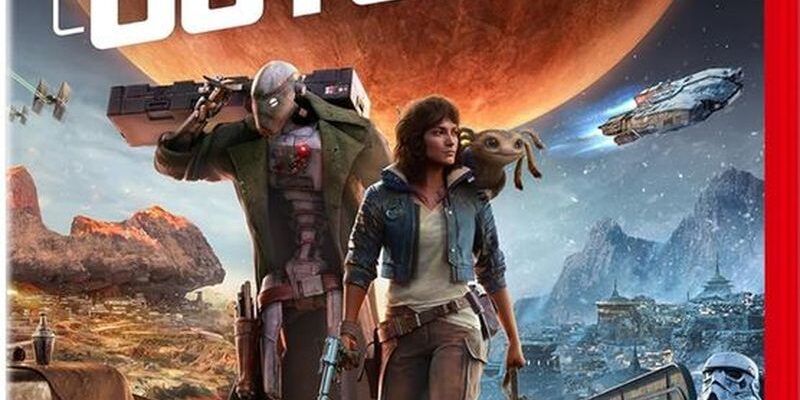In an era where the lines between physical and digital media continue to blur, a recent revelation from Ubisoft regarding the upcoming Nintendo Switch 2 version of Star Wars Outlaws has ignited a familiar debate. Forget your traditional cartridges; for this open-world adventure, Switch 2 owners will reportedly be relying on “Game Key Cards.” A pragmatic decision born from technical necessity, or a subtle push towards a fully digital future? Ubisoft weighs in.
The Technical Imperative: When Cartridges Can`t Keep Up
The core of the issue, according to Rob Bantin, an audio architect for the Snowdrop Engine at Ubisoft, boils down to performance. In a frank discussion, Bantin explained that Star Wars Outlaws, with its sprawling open-world environments, “relies heavily on disk-streaming.” Modern game development, particularly for ambitious titles, often leverages the high-speed Solid State Drives (SSDs) found in current-generation consoles like the PlayStation 5 and Xbox Series X|S. These SSDs allow for rapid data access, crucial for rendering vast landscapes and intricate details without jarring pauses.
However, it seems the physical media planned for the Nintendo Switch 2 — while undoubtedly an upgrade from its predecessor — simply couldn`t deliver the necessary read speeds to meet the game`s quality targets. “I think if we`d designed a game for Switch 2 from the ground up it might have been different,” Bantin noted, suggesting a classic case of fitting a square peg into a slightly less-square hole. The game was initially optimized for platforms with robust SSDs, and the Switch 2, arriving later in the development cycle, presented a unique challenge. Ubisoft`s leadership, Bantin contends, made “the right call.”
Game Key Cards: A Solution, But At What Cost?
For the uninitiated, Game Key Cards are precisely what they sound like: physical cards that contain a digital download code rather than the full game data. This isn`t an entirely new concept, but its application to a flagship title on a new Nintendo console is certainly raising eyebrows among the notoriously passionate Nintendo fanbase. On one hand, these cards offer a semblance of physical ownership. They can be resold, much like traditional cartridges, and are not tied to a specific console.
Yet, the controversy lingers. Critics are quick to point out that by essentially providing a glorified download voucher, these cards undermine the very principle of physical game ownership. The long-term implications for game preservation are a significant concern; should a digital storefront cease operations or a specific title be delisted, the “physical” Game Key Card becomes little more than a plastic memento. It`s a pragmatic compromise for developers, perhaps, but one that nudges consumers further into the digital ecosystem, whether they like it or not.
Performance vs. Principle: A Respectable Showing
Despite the heated debate surrounding its distribution method, Star Wars Outlaws on the Switch 2 is reportedly a respectable technical achievement. Early gameplay footage suggests a consistent 30 frames per second performance. While this might not rival the buttery smooth visuals of its PC, PS5, or Xbox Series X|S counterparts, achieving such stability for a graphically demanding open-world title on a handheld-hybrid console is noteworthy. It signals that the Switch 2 is indeed capable of handling more ambitious third-party titles, even if some concessions are necessary. This contrasts sharply with anecdotal reports of other high-fidelity games, such as Elden Ring, struggling significantly on Nintendo`s new hardware.
The game itself launched on Switch 2 on September 4, a full year after its initial release on other platforms. This version thoughtfully bundles both of its DLC expansions, “Wild Card” and “A Pirate`s Fortune.” However, the journey for Star Wars Outlaws hasn`t been without its own turbulence. Ubisoft CEO Yves Guillemot previously attributed the game`s underperformance to the “choppy waters” of the Star Wars brand. A charitable interpretation, perhaps, given that initial reviews and fan feedback often highlighted a sluggish introductory mission and various technical glitches at launch. Thankfully, most of these issues have since been ironed out, and its post-launch expansions have been generally well-received.
The Future of “Physical” on Switch 2 and Beyond
Ubisoft`s decision for Star Wars Outlaws on the Nintendo Switch 2 could be a harbinger of things to come. Will Game Key Cards become a common solution for graphically intensive titles struggling to fit onto physical cartridges designed for portable performance? This situation highlights the ongoing tension between technological advancement and consumer expectations for physical media. As game worlds grow ever larger and more detailed, the traditional cartridge may find itself increasingly challenged to keep pace.
Ultimately, while the Game Key Card for Star Wars Outlaws provides a pragmatic workaround for Ubisoft`s technical hurdles, it also reignites a fundamental discussion about what “owning” a game truly means in the digital age. It`s a reminder that even in the whimsical worlds of Star Wars, the realities of data streaming and storage can be as challenging as navigating an asteroid field.







